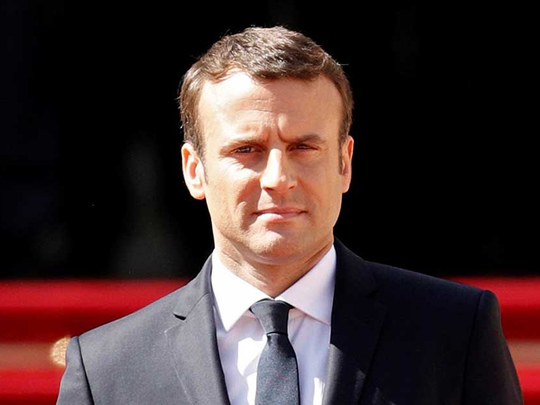
Although I can’t claim to personally know President Emmanuel Macron and never met him at any conference, at the end of the day, we are fellow professionals with the same outlook. I was very happy with him winning the French election and I can foretell some challenges he will face based on my understanding of his economic views, which tend to be more moderate and far removed from theorising in an unrealistic manner.
Macron is inheriting a troubled economy where the first quarter of 2017 growth rate posted a measly 0.3 per cent and affected by lukewarm demand aligned to a continuous erosion of purchasing power of the French consumer since the global crisis of 2008.
France unemployment rates are also the highest in Europe, at 10 per cent, not to mention the growing public debt and trade deficit, expected to reach €50 billion (Dh203.6 billion) this year. Many companies have become reluctant to invest in France due to high tax rates and production costs, and the non-stop labour protests are adding salt to France’s injuries.
Trade unions, which play an influential role in France, are in conflict with the new President since his first day in office without giving him a chance to introduce his plans, which I expect will help resolve many of the difficulties.
Trade unions
Macron will seek to offer companies new incentives to attract investments and boost competitiveness, particularly by reforming the tax system, a move that is opposed by trade unions.
The current tax system does nothing but harm productivity and increase production costs due to the strikes, which disadvantage French products’ competitiveness and reduce exports. This fact is yet to be understood by trade unions.
If Macron succeeds in surmounting these objections, which is very difficult to do, he will take the economy to new heights, raise growth and decrease unemployment and the trade deficit thanks to a growth in exports.
These would be achieved if workers understood economic policies and the President’s ability to reform, keeping in mind that cannot be achieved overnight.
The problem with Macron now is that he does not depend on a key social base or political party as is the case for German Chancellor Angela Merkel and British Prime Minister Theresa May. He became president by chance as the traditional parties failed in government. And the far right, which was competing with Macron, does not sit right with the French community.
Hence, economic reformation will be very difficult to achieve and will increase France’s economic crisis.
Irish experiment
Therefore, the only guarantee for Macron’s success is to forge cooperation between all sides, including the private sector, workers and investors. That does not seem to be realisable, especially as the trade unions keep on staging protests fully convinced that he will support business interests. It is a wrong belief as he will have the interests of France as a whole.
The French can take lessons from Irish experiment, one of the early European countries to get itself out of the crisis and develop its sectors. The government managed to do so through continuous meetings with the private sector and workers by which they reached an agreement on taking the economy out of its difficulties. All parties had to make concessions but this ended up in Ireland achieving a resounding success.
Internal disputes always hinder growth and stoke crisis. That is why Macron should be given the opportunity in his new task. More so as he has succeeded in his previous tasks.
Dr Mohammad Al Asoomi is a UAE economic expert and specialist in economic and social development in the UAE and the GCC countries.












